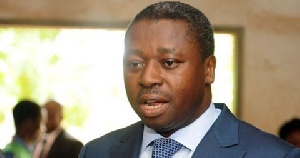 Faure Gnassingbe won the Togo elections
Faure Gnassingbe won the Togo elections
Togo’s President Faure Gnassingbe has won re-election with 72% of the vote, according to preliminary results from the electoral commission on Monday, extending his 15-year rule and a family dynasty that began when his father took power in a 1967 coup.
Despite widespread disaffection and protests calling for him to step down, a fractured opposition has struggled to launch a concerted campaign to unseat Gnassingbe in the small West African country of 8 million people.
His closest rival, former Prime Minister Gabriel Messan Agbeyome Kodjo, won 18% of the vote and longtime opposition leader Jean-Pierre Fabre got 4%.
The final results are expected to be announced by the Supreme Court in the coming days.
If confirmed, the result gives Gnassingbe five more years in power, a blow for opposition protestors who have taken to the streets in recent years, calling for him to step down.
In response to political pressure, Gnassingbe enacted a law last year limiting presidents to two five-year terms. However, it is not backdated to account for the three terms he has already served, so he could stay in power until 2030.
Some political observers have expressed concern that a Gnassingbe win could spark fresh protests, though the streets of the oceanside capital Lome were calm in the early hours of Monday morning immediately after the vote.
When Gnassingbe came to power in 2005 after his father’s death, mass protests erupted that were met with a violent police crackdown during which at least 500 were killed.
Togo is the 10th poorest country in the world, according to the International Monetary Fund.
Gnassingbe has long promised to boost economic development and the country has seen annual economic growth of around 5% in recent years, driven by investment in energy and transport.
But grinding poverty and labour strikes are constant reminders of the challenges ahead.